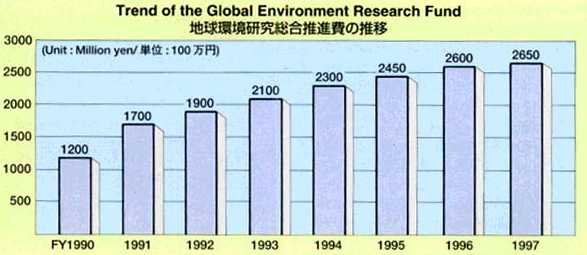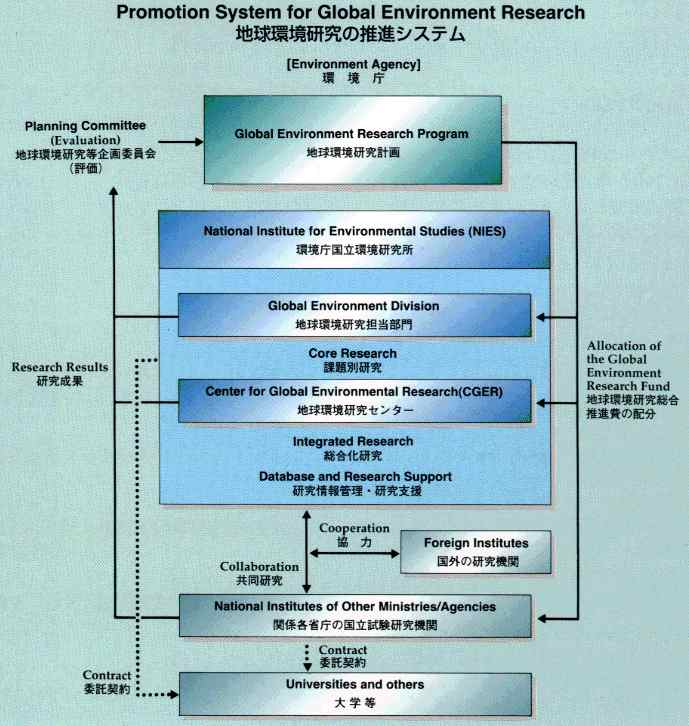Global Environment
Global Environment Research in Japan - Global Environment Research Program
Global Environment Research Program
Research and Information Office, Global Environment Department, Environment Agency
Purpose of the Program
This document describes basic policies and subjects relating to the global environment research made possible by the Global Environment Research Fund, which was established by the Environment Agency. The goal of this program is to provide the foundation for the conservation of the global environment in cooperation with similar international efforts.
Basic Concept
Global environmental problems are matters far more vast in scale than any environmental problems faced before. They cut across many fields, and many of their mechanisms and impacts remain unclear. Comprehensive and integrated research programs are needed to address these issues. The Global Environment Research Program promotes research on the global environment according to the following basic concepts, while considering domestic and international trends in global environment problems.
- (1)
- In order to promote multidisciplinary and international research on the global environment, an interchange between related researchers should be encouraged. Mutual coordination and collaboration among national research institutes, universities and other research organizations should be promoted with the cooperation of related ministries and agencies.
- (2)
- The Global Environment Research Program will assume an appropriate role in international research efforts and promote cooperative activities with foreign researchers and research organizations, through participation in and coordination with international research programs such as the International Geosphere-Biosphere Program (IGBP) and the World Climate Research Programme (WCRP).
Research Area
Research on the global environment includes the following three types of research in the following nine areas:
(1) Types
- A.
- Research on the effects of human activities on the global environment, and research on the impact of global environmental change on human health and ecosystems
- B.
- Research on policy planning to conserve the global environment
- C.
- Other research necessary to promote the above research types
(2) Areas
- Depletion of the ozone layer
- Global warming
- Acid precipitation
- Marine pollution (including changes in the marine environment caused by human activities)
- Tropical deforestation
- Loss of biological diversity
- Desertification
- Human Dimensions of Global Environmental Problems
- Other global environmental problems
Classification and Contents of Research
Research under this program will be classified into six categories, depending on the purpose and the scope of research subjects and the research-conducting entity.
(1) Core Research
Research in the individual area of global environment research: This research is done by the national research institutes and other governmental organs. If necessary, the national research institutes and other governmental organs can contract with universities, private research institutes, etc.


(2) Integrated Research
Research integrating core research or covering different research areas comprehensively: This research is conducted by the Center for Global Environmental Research (CGER) or other national research institutes cooperating with CGER. If necessary, CGER and other national research institutes can contract with universities, private research institutes, etc.
(3) Feasibility Studies
Studies necessary to review the research subjects for the areas in which concrete research methods have not been clarified: These studies will be conducted by national research institutes or the Environmental Agency. If necessary, the national research institutes and Environmental Agency can contract with universities, private research institutes, etc.
(4) Priority Research
Research which is recognized to be of particularly high priority, including 1) research for important policy needs, 2) research requiring large-scale observation, and 3) research based on international joint research programs: This research is done by national research institutes. If necessary, the national research institute can contract with universities, private research institutes, etc.
(5) Cooperative Research with Developing Countries
Studies where joint research in an entire region is necessary, particularly with institutions in developing countries and those transforming to market economies: This research is done by national research institutes. If necessary, the national
research institutes can contract with universities, private research institutes, etc.
(6) International Exchange Research (Eco-Frontier Fellowship Program)
Studies in which leading researchers are invited to Japan from overseas to conduct joint research in a host institute: This research is done by national research institutes. If necessary, national research institutes can contract with universities, private research institutes, etc.
(7) Pioneering Global Environment Research
Research projects where concrete methods or technologies are not firmly established, but where actively nurturing or consolidating research themes can be expected to contribute to the progress of innovative research to solve global environmental problems by the development and introduction of research theories, technological innovations or analytical methods based on new concepts which exist as potential elements: This research is done by national research institutes or the Environmental Agency. If necessary, a portion of research themes can be contracted out by the National Institute for Environmental Studies to universities, private institutions, etc.
Evaluation of Results
The results of the research efforts under this program are evaluated by the Planning Committee, with respect to such criteria as the progress in the research work, contributions to the conservation of the global environment, and contribution to international joint research programs.